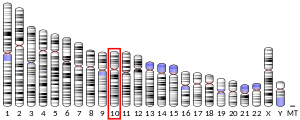Cerebral dopamine neurotrophic factor
Cerebral dopamine neurotrophic factor also known as ARMET-like protein 1 is a protein that in humans is encoded by the CDNF gene.[5][6]
| CDNF | |||||||||||||||||||||||||
|---|---|---|---|---|---|---|---|---|---|---|---|---|---|---|---|---|---|---|---|---|---|---|---|---|---|
| |||||||||||||||||||||||||
| Identifiers | |||||||||||||||||||||||||
| Aliases | CDNF, ARMETL1, cerebral dopamine neurotrophic factor | ||||||||||||||||||||||||
| External IDs | OMIM: 611233 MGI: 3606576 HomoloGene: 27965 GeneCards: CDNF | ||||||||||||||||||||||||
| |||||||||||||||||||||||||
| |||||||||||||||||||||||||
| |||||||||||||||||||||||||
| Orthologs | |||||||||||||||||||||||||
| Species | Human | Mouse | |||||||||||||||||||||||
| Entrez | |||||||||||||||||||||||||
| Ensembl | |||||||||||||||||||||||||
| UniProt | |||||||||||||||||||||||||
| RefSeq (mRNA) | |||||||||||||||||||||||||
| RefSeq (protein) | |||||||||||||||||||||||||
| Location (UCSC) | Chr 10: 14.82 – 14.84 Mb | Chr 2: 3.51 – 3.53 Mb | |||||||||||||||||||||||
| PubMed search | [3] | [4] | |||||||||||||||||||||||
| Wikidata | |||||||||||||||||||||||||
| |||||||||||||||||||||||||
References
- GRCh38: Ensembl release 89: ENSG00000185267 - Ensembl, May 2017
- GRCm38: Ensembl release 89: ENSMUSG00000039496 - Ensembl, May 2017
- "Human PubMed Reference:". National Center for Biotechnology Information, U.S. National Library of Medicine.
- "Mouse PubMed Reference:". National Center for Biotechnology Information, U.S. National Library of Medicine.
- "Entrez Gene: Cerebral dopamine neurotrophic factor".
- Lindholm P, Voutilainen MH, Laurén J, Peränen J, Leppänen VM, Andressoo JO, Lindahl M, Janhunen S, Kalkkinen N, Timmusk T, Tuominen RK, Saarma M (Jul 2007). "Novel neurotrophic factor CDNF protects and rescues midbrain dopamine neurons in vivo". Nature. 448 (7149): 73–7. doi:10.1038/nature05957. PMID 17611540.
Further reading
- Choi JM, Hong JH, Chae MJ, Ngyuen PH, Kang HS, Ma HI, Kim YJ (Apr 2011). "Analysis of mutations and the association between polymorphisms in the cerebral dopamine neurotrophic factor (CDNF) gene and Parkinson disease". Neuroscience Letters. 493 (3): 97–101. doi:10.1016/j.neulet.2011.02.013. PMID 21320571.
- Xu XR, Huang J, Xu ZG, Qian BZ, Zhu ZD, Yan Q, Cai T, Zhang X, Xiao HS, Qu J, Liu F, Huang QH, Cheng ZH, Li NG, Du JJ, Hu W, Shen KT, Lu G, Fu G, Zhong M, Xu SH, Gu WY, Huang W, Zhao XT, Hu GX, Gu JR, Chen Z, Han ZG (Dec 2001). "Insight into hepatocellular carcinogenesis at transcriptome level by comparing gene expression profiles of hepatocellular carcinoma with those of corresponding noncancerous liver". Proceedings of the National Academy of Sciences of the United States of America. 98 (26): 15089–94. doi:10.1073/pnas.241522398. PMC 64988. PMID 11752456.
- Lohoff FW, Bloch PJ, Ferraro TN, Berrettini WH, Pettinati HM, Dackis CA, O'Brien CP, Kampman KM, Oslin DW (Apr 2009). "Association analysis between polymorphisms in the conserved dopamine neurotrophic factor (CDNF) gene and cocaine dependence". Neuroscience Letters. 453 (3): 199–203. doi:10.1016/j.neulet.2009.02.026. PMC 2680755. PMID 19429035.
- Parkash V, Lindholm P, Peränen J, Kalkkinen N, Oksanen E, Saarma M, Leppänen VM, Goldman A (Apr 2009). "The structure of the conserved neurotrophic factors MANF and CDNF explains why they are bifunctional". Protein Engineering, Design & Selection. 22 (4): 233–41. doi:10.1093/protein/gzn080. PMID 19258449.
External links
This article is issued from Wikipedia. The text is licensed under Creative Commons - Attribution - Sharealike. Additional terms may apply for the media files.



